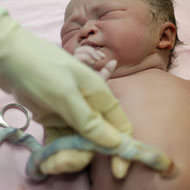- General Articles
- General Pregnancy Questions
- Baby Growth
- Pregnancy Diet
- Miscarriage
- During Pregnancy
- Twin Pregnancy
- Toddler Meals
- Home Remedies During Pregnancy
- Breastfeeding
- Pregnancy Week By Week
- Pregnancy Tests
- Ectopic Pregnancy
- Pregnancy Signs and Symptoms
- Pregnancy Stages
- Potty Training
- Fetal Development
- Preschooler
- Postpartum Depression
- Toddler Illness
- Baby Care
- After Pregnancy
- Molar Pregnancy
- During Delivery
- Beauty and Style
- Pregnancy Clothing
- Preconception
- Fertility
Baby Growth Spurts and Sleep
Baby growth spurts and sleep are deeply interrelated. During the early stages of a baby's life, the growth spurts are almost visible. The sleep patterns change according to the growth spurt that the baby is experiencing. The major indicator of a baby's growth is the demand for cluster feedings. The baby may remain hungry, and the sleep patterns will continue to change. Baby growth spurts and sleep patterns are related in the way that when the baby is experiencing a growth spurt, it will have less regular sleep and may demand food at odd timings. See also baby growth chart
It is these baby growth spurts that account for the sudden and often drastic changes in the weight and height of the baby. Mothers are often able to note when the baby requires increased feeding and demands to be fed at all odd hours of the day. Since this is an important part of the physical maturation process, women feed their babies whenever they demand for food.
With a baby growth spurt, schedule of sleep may not be very easy to maintain. The sleep patterns consistently change, therefore demanding the mother to incorporate similar changes in the feeding patterns as well. Infants may either be sleeping too much or sleeping too less. Baby growth spurt and insomnia are not completely unheard of. The first growth spurt that affects the sleep of the baby can be seen when the baby is only a week old. After this, the next growth spurt can be observed when the baby is three months old, then at six months and then finally at months.
It is important to understand how a child sleeps in the early months of its life. Usually, the child would sleep whenever it is tired. If a baby does not want to sleep, there is little anyone can do about it. Babies also have very tiny tummies, and therefore, they get full very fast. If you try and put your baby to sleep when it does not want to sleep, you will be in for some trouble and a lot of whining. Babies can digest formula and breast milk very rapidly. This means that babies can get hungry in almost no time. So don't be surprised if your baby wants food after every few hours. Newborns usually need to be fed almost every two to four hours. Sometimes, they may get hungry more than that as well. Pregnancy growth spurts and sleep are also interrelated, when the mother sleeps well, the baby is also able to grow well.
Read more articles from the Baby Growth Category.



 7 Must-Haves Before Your Baby Arrives
7 Must-Haves Before Your Baby Arrives Bonding Games for Babies
Bonding Games for Babies DIY Baby Bath Towel Apron
DIY Baby Bath Towel Apron Common Late Pregnancy Fears
Common Late Pregnancy Fears